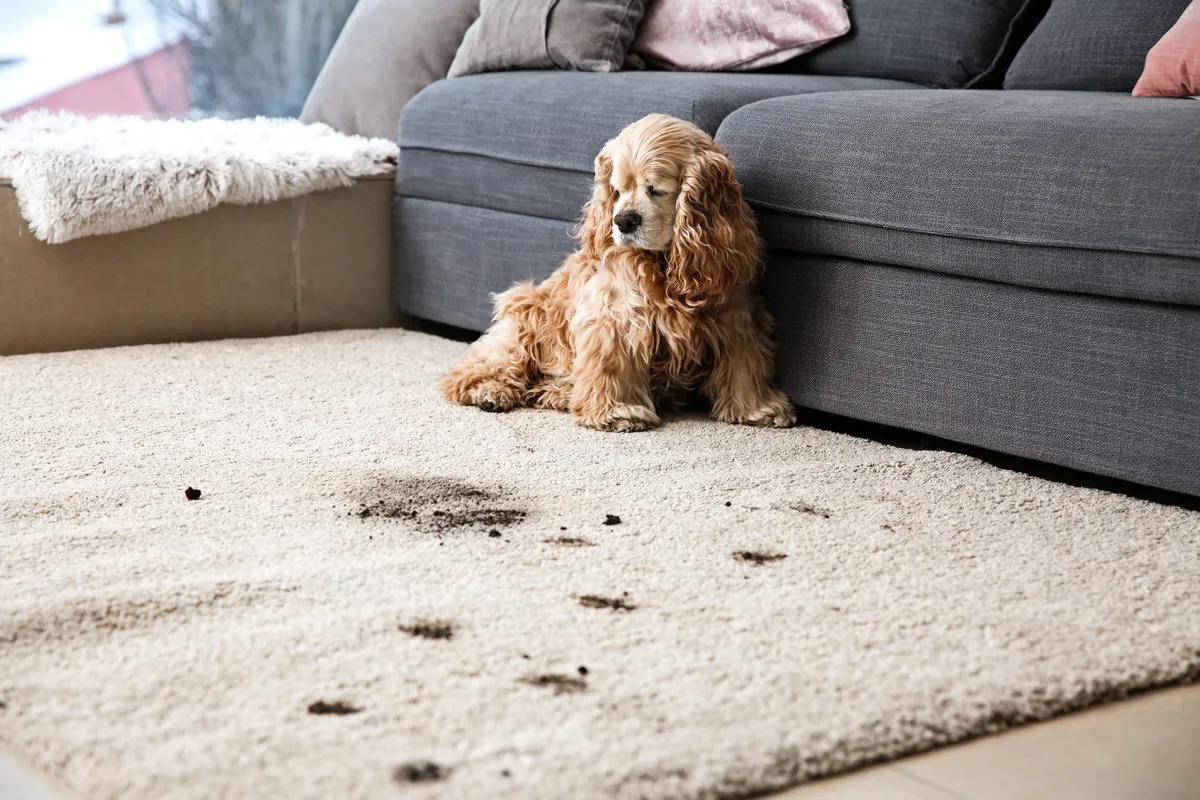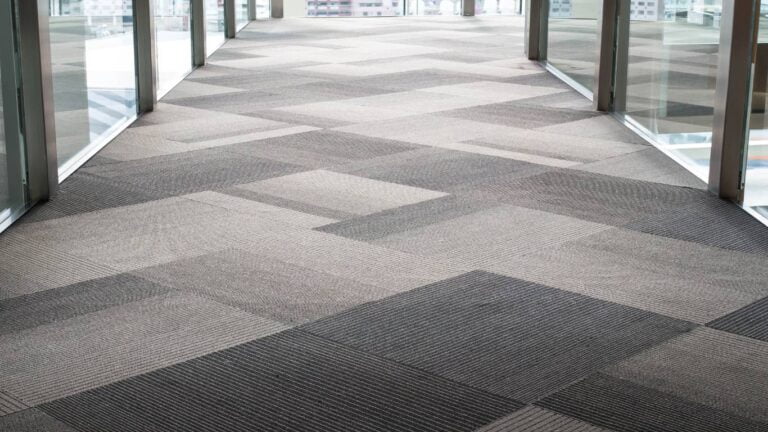Dealing with a lingering urine smell in your carpet can be a nose-wrinkling hassle. Whether it’s a pet accident or a spill from a little one, understanding how to get urine smell out of carpet is essential for a fresh and clean-smelling home. It’s not just about masking the odour; it’s about getting to the root of the problem and eliminating it. From identifying the source with a trusty blacklight to employing the power of enzymatic cleaners, this guide outlines a strategic approach to banish that stubborn stench. Get ready to arm yourself with the knowledge and tools needed to tackle those pesky urine odours head-on and restore your carpets to their former glory.
Understanding Urine Odours in Carpet
Identifying the Source of the Smell
The first step in tackling urine odours in carpets is to pinpoint where the smell is coming from. This can be tricky since stains might not always be visible. But here’s a tip: using a blacklight in a dark room can help you spot urine deposits.
The blacklight makes certain elements in the urine, like phosphorus and proteins, light up. This shows you the hidden spots that need cleaning. But remember, other substances, such as some laundry detergents and foods, can also glow under blacklight, so you’ve got to be sure of what you’re seeing.
Reasons Why Urine Smell Persists
Urine odours can stick around for a bunch of reasons. At first, urine is usually odourless, but as it breaks down, it starts to smell. Compounds like urea, uric acid, and creatinine, along with other waste products, are what make the odour linger.
Uric acid is particularly clingy, forming crystals that stick to carpet fibres, especially when the urine dries. These crystals aren’t water-soluble and don’t budge with regular cleaning. That’s why the smell can hang around even after you’ve cleaned the surface or vacuumed.
The Science Behind Urine Odours
To get rid of urine odours for good, you’ve got to understand what’s behind them. How strong the smell is can depend on the urine’s concentration and what’s in it, which can change with how much water you drink, what you eat, and any meds you might be taking. Some foods and drinks can even make the urine smell stronger.
Sometimes, if the urine odour is really strong, it could be a sign of a health issue, like a urinary tract infection or diabetes, especially if there’s also pain during urination or the urine looks cloudy. The trick to getting rid of the smell is to break down those uric acid crystals.
Home remedies like vinegar, which can neutralise odours, and baking soda, which absorbs smells, can give you some relief. But they might not get rid of the odour or the crystals completely. Enzymatic cleaners, on the other hand, use enzymes or good bacteria to break down the uric acid into stuff that doesn’t smell, attacking the problem at its source.
You can find these products in sprays and powders, and it’s important to pick ones that are safe for both pets and kids. If you’re dealing with a really tough or old smell, you might need to call in the pros for a carpet cleaning service.
They use heavy-duty equipment and strong cleaners that get deep into the carpet, backing, and padding to remove stains and odours at the core. This kind of deep clean doesn’t just tackle the current smell but can also help stop pets from marking the same spot again.
To avoid this hassle in the future, it’s a good idea to clean up accidents quickly, keep up with carpet maintenance, and train your pets well. If you’re caring for older folks or someone with a medical condition, you might need to take extra steps to prevent accidents. Keeping an eye on things and regular cleaning can help your carpets stay fresh and free from those stubborn urine odours.

Immediate Actions to Take
Blotting the Wet Spot
Act quickly to prevent the urine from penetrating further into the material. Use a clean towel or paper towels to absorb the liquid. Employing a shop-vac can effectively remove any residual moisture, which if neglected, could encourage bacterial growth and the associated unpleasant smells.
Avoiding Common Mistakes
Avoid exacerbating the situation by not using a steam cleaner, which can permanently seal in the odours and discoloration. After absorbing the liquid, rinse with cool water and blot to remove additional moisture. When applying cleaning agents, dab gently rather than rubbing to avoid driving the urine deeper into the material.
Natural vs. Chemical Absorbents
For odour elimination, a homemade solution of equal parts white vinegar and water can help neutralise the smell. Apply the mixture to the affected area and then press down with a paper towel to absorb it. Baking soda can also be used as a natural deodorizer; sprinkle it on the dry area, let it sit to absorb odours, and then vacuum thoroughly.
For tougher jobs, a concoction of hydrogen peroxide and a teaspoon of dishwashing detergent can be applied. Exercise caution with this blend to avoid lightening the colours of certain fabrics. After the area has dried, vacuum to remove any residue.
Enzymatic cleaners are another effective option, breaking down the proteins in urine and neutralising odours at their source. Products such as Enzyme Wizard and Rocco & Roxie Professional Stain & Odour Eliminator are formulated for use on various surfaces.
For a refreshing aroma post-cleaning, products like Angry Orange Pet Odour Eliminator can impart a pleasant citrus fragrance. In cases where home remedies and enzymatic cleaners fall short, particularly with extensive or ingrained stains, professional cleaning services may be necessary. They have access to potent solutions and can perform a comprehensive clean that not only addresses odours at the molecular level but also deters pets from reoffending.
Preventative measures like routine cleaning, using protective covers, and effective pet training can help minimise the likelihood of future incidents.
Natural Cleaning Solutions
Homemade Mixtures and Their Effectiveness
Creating a solution with white vinegar and water can be a straightforward approach to addressing urine odours. By combining these ingredients in a spray bottle, you can apply the mixture to the soiled area to help dissolve the urine and mitigate the odour.
For persistent stains, a combination of hydrogen peroxide, baking soda, and a small amount of dish soap may be more effective. It’s best to mix this solution gently to avoid excessive foaming and use it promptly, as hydrogen peroxide degrades into water when exposed to light and air. Testing this mixture on an inconspicuous spot is recommended due to its potential bleaching effect.
The Power of Vinegar and Baking Soda
The acidic properties of vinegar, particularly white distilled vinegar, are beneficial for lifting stains and disinfecting surfaces by eliminating bacteria. Enhancing the vinegar solution with baking soda can improve its stain-removing capabilities. To address any residual vinegar odour, a subsequent application of baking soda can be helpful.
Incorporating Essential Oils
Adding essential oils to a water and baking soda mixture can create a deodorising spray that leaves a pleasant fragrance. Alternatively, homemade reed diffusers or refilled plug-in air fresheners with a blend of essential oil and water can provide a lasting pleasant scent in your environment.

Commercial Cleaners and Enzymatic Solutions
How Enzymatic Cleaners Work
Enzymatic cleaners are adept at addressing the persistent issue of urine odour. These products contain enzymes, which are biological catalysts that accelerate chemical reactions, operating optimally at a neutral pH, typically between 6 and 8.
The enzymes, such as proteases, amylases, and lipases, are specific to the type of soil they combat. Proteases, for instance, are particularly effective against protein-based stains like urine and faeces. By catalysing the breakdown of complex organic soils, these enzymes facilitate a more efficient cleaning process.
Enzymatic cleaners excel at dismantling uric acid, a component of urine that clings tenaciously to surfaces due to its insolubility in water. By disintegrating the uric acid molecules, these cleaners eradicate odours and stains.
Choosing the Right Commercial Product
Selecting an appropriate enzymatic cleaner requires consideration of the stain in question. For urine, a product with proteases is ideal. These cleaners are generally safe for environments with children and pets and are eco-friendly, decomposing naturally.
However, they are not suitable for all materials, such as leather, and do not possess virucidal properties—that’s where disinfectants come into play.
While effective on delicate fabrics and requiring minimal quantities, multiple applications may be necessary to fully eliminate odours and stains.
Step-by-Step Application Process
For optimal use of enzymatic cleaners, a thorough application process is recommended. Begin by removing any solid waste from the area. Saturate the stain with the cleaner, allowing it to penetrate as deeply as the urine.
Allowing the product to air dry, typically overnight, is essential for the enzymes to act on the organic matter. As they break down the molecules, beneficial bacteria consume the resulting fragments, removing the stain and neutralising any residual smell that might attract pets to re-soil the area.
Ensuring proper ventilation during the drying process can mitigate potential allergic reactions in pets and expedite drying. Understanding the mechanics of enzymatic cleaners and adhering to the correct application steps can significantly aid in maintaining a clean and odour-free home with pets.
Prevention and Long-term Care
Tips to Prevent Future Accidents
Understanding the root causes of indoor urination and implementing preventative measures is essential. For pet owners, sterilising your pets can greatly reduce the likelihood of territorial marking. The earlier this procedure is performed, the more effective it will be in curbing such tendencies.
Employing house training strategies suitable for adult canines can alter their marking behaviours. Ensuring that previously soiled spots are cleaned with products that eliminate urine scent is vital, as pets are drawn to areas that have a familiar smell. Restricting access to these spots or making them unappealing may deter pets from revisiting them.
For canines that exhibit submissive urination, addressing the underlying emotional triggers is key. Boosting their confidence through positive reinforcement and maintaining a stable routine can be beneficial. Punishment should be avoided as it can heighten stress and exacerbate the issue.
In challenging situations, consulting with a veterinarian about potential medications or seeking guidance from an animal behaviour specialist may be advisable.
Routine Cleaning Recommendations
Maintaining a regular cleaning schedule is crucial for a hygienic and odour-free environment. In restrooms, urine that misses its intended target can be a significant source of unpleasant odours. These smells originate from bacterial byproducts, making it imperative to eliminate the source.
An acidic cleaner can effectively remove urine from bathroom surfaces, followed by an EPA-registered disinfectant to eradicate bacteria. For porous materials like grout, which can harbour bacteria, additional steps may be required.
For pet owners, prompt attention to accidents with enzymatic cleaners is crucial. These products target the bacteria and urine proteins that adhere to fabrics and flooring. Consistent cleaning not only addresses immediate odour issues but also contributes to the overall maintenance and appearance of your home.
When to Seek Professional Cleaning Services
There are instances when home cleaning efforts fall short, particularly with persistent or aged stains and odours. Professional cleaners can offer a more thorough cleaning, utilising commercial-grade equipment and specialised solutions that reach deep into carpets and padding.
This process is vital for eliminating urine crystals and the pathogens present in pet urine and faeces. It’s important to be mindful of the cleaning agents used by professionals.
Opting for services that employ non-toxic, hypoallergenic, and environmentally friendly products ensures the safety of all household members, including pets. Professional cleaning does more than just eliminate odours and enhance your living space; it also contributes to the longevity and aesthetic of your carpets and furnishings.
View our odour control services here.
Urine Odour Control: Your Next Steps
Tackling urine odour is no walk in the park, but armed with the right tools and techniques, it’s a battle you can win. From natural home remedies to the bio-magic of enzymatic cleaners, there’s a spectrum of strategies at your disposal to neutralise those persistent pongs.
Remember, immediate action is your best friend for preventing smells from setting up shop in your home—act fast, and act smart. Whether you’re dabbling in DIY solutions or calling in the cavalry with professional cleaning services, a thoughtful approach can preserve the freshness of your space.
Most importantly, preventative practices will safeguard your serene, scent-free sanctuary. Swift cleanups, protective measures, and a bit of pet psychology can keep those accidental aromas at bay.
Embrace these insights and say goodbye to the troublesome taint of urine odour. Your nose (and your furry friends) will thank you.




